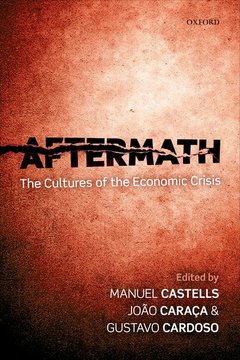Description
Aftermath
The Cultures of the Economic Crisis
Coordinators: Castells Manuel, Caraça João, Cardoso Gustavo
Language: English
Subjects for Aftermath:
Publication date: 07-2012
330 p. · 16.4x24.3 cm · Hardback
Out of Print
330 p. · 16.4x24.3 cm · Hardback
Out of Print
Description
/li>Contents
/li>Biography
/li>
The crisis of global capitalism that has unfolded since 2008 is more than an economic crisis. It is structural and multidimensional. The sequence of events that have taken place in its aftermath show that we are entering a world that is very different from the social and economic conditions that characterized the rise of global, informational capitalism in the preceding three decades. The policies and strategies that intended to manage the crisis-with mixed results depending on the country-may usher in a distinctly different economic and institutional system, as the New Deal, the construction of the European Welfare State, and the Bretton Woods global financial architecture all gave rise to a new form of capitalism in the aftermath of the 1930s Depression, and World War II. This volume examines the cultures and institutions at the root of the crisis, as well as the conflicts and debates that lead to a new social landscape, including the rise of alternative economic cultures expressed in the social movements occupying Wall Street. The book presents the results of a shared project of reflection by an interdisciplinary group of researchers from around the world. It contends that there is no quick fix to the current financial and political system. Life beyond the crisis requires a transformation of the mindset that led to bankruptcy and despair, and to economies and societies based on an unsustainable model of speculative finance and political irresponsibility. The book explains why and explores the contours of the world emerging in the aftermath of the crisis.
1. The Cultures of the Economic Crisis: An Introduction. PRELUDE. 2. The Rolling Apocalypse of Contemporary History. 3. The Separation of Cultures and the Decline of Modernity. WHICH CRISIS? WHOSE CRISIS?. 4. The Metamorphosis of a Crisis. 5. Financial Crisis or Societal Mutation?. DEALING WITH THE CRISIS. 6. Branding the Crisis. 7. In Nationalism We Trust?. 8. Crisis, Identity and the Welfare State. BEYOND THE CRISIS. 9. Surfing the Crisis: Cultures of Belonging and Networked Social Change. 10. Beyond the Crisis: The Emergence of Alternative Economic Practises. THE NON-GLOBAL GLOBAL CRISIS. 11. No Crisis in China? The Rise of China's Social Crisis. 12. A Non-Global Crisis? Challenging the Crisis in Latin America. AFTERMATH?.
Manuel Castells is University Professor and the Wallis Annenberg Chair of Communication Technology and Society at the University of Southern California. He is also Professor Emeritus of Sociology and Planning, University of California, Berkeley, where he taught for 24 years. He is a Fellow of the American Academy of Political and Social Science, of the Academia Europaea, of the Spanish Royal Academy of Economics, and of the British Academy. His main books include the trilogy The Information Age: Economy, Society, and Culture (Blackwell, 1996-2003) and Communication Power (OUP, 2009). He was a founding member of the board of the European Research Council and is a member of the Governing Board of the European Institute of Innovation and Technology. João Caraça obtained a D. Phil. in Nuclear Physics at the University of Oxford and the Agregação in Physics at the Lisbon Faculty of Sciences. He is Director of the Science Department of the Calouste Gulbenkian Foundation, Lisbon and also Full Professor of Science and Technology Policy at the Instituto Superior de Economia e Gestão of the Universidade Técnica de Lisboa. He is member of the Governing Board of the European Institute of Innovation and Technology - EIT. He also integrates the Steering Group of the European Forum on Philanthropy and Research Funding and is President of the Advisory Board of the Portuguese Business Association for Innovation - COTEC. He was Science Adviser of the President of the Portuguese Republic (1996-2006), has published over 150 scientific papers, and co-authored Limits to Competition (1995), co-edited O Futuro Tecnológico (1999) and collaborated in Le Printemps du Politique (2007). Gustavo Cardoso is Professor of Media and Society at IUL - Lisbon University Institute. His areas of interest are the cultures of the network society, the transformations of the notions of property, distribution and production of cultural goods, and the role of online social networking. Between 1996 and 2006 he
© 2024 LAVOISIER S.A.S.




